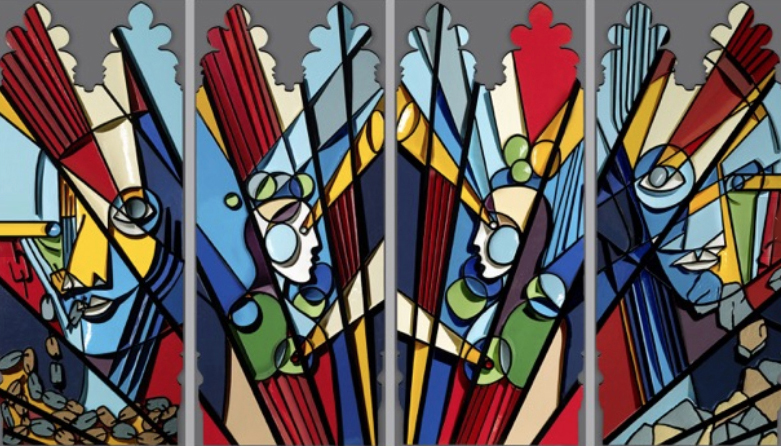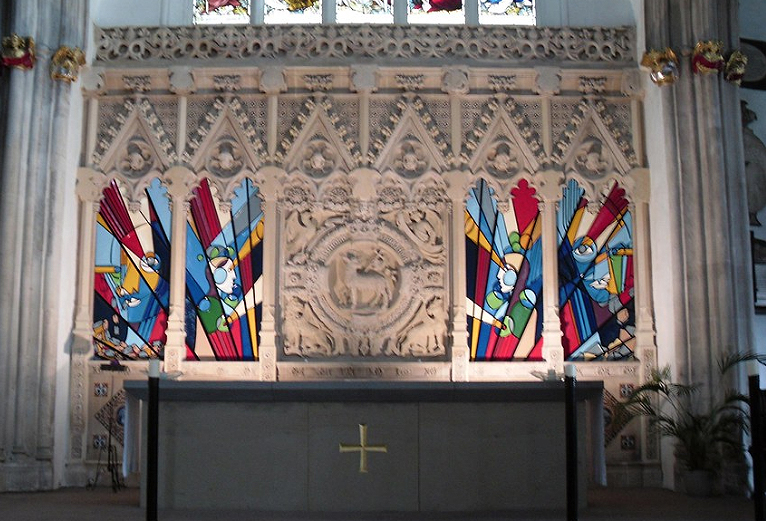January 5: Give to Your Enemies
♫ Music:
Sunday, January 5
Title: GIVE TO YOUR ENEMIES
Scripture: Luke 6: 35, Romans 12: 20-21
But love your enemies, and do good, and lend, hoping for nothing in return: and your reward will be great; and you shall be the children of the Highest: for he is kind to the unthankful and to the evil.
Therefore if your enemy hunger, feed him; if he thirst, give him drink: for in so doing you will heap coals of fire on his head. Be not overcome by evil, but overcome evil with good.
Poetry:
Bent to the Earth
By Blas Manuel de Luna
They had hit Ruben
with the high beams, had blinded
him so that the van
he was driving, full of Mexicans
going to pick tomatoes,
would have to stop. Ruben spun
the van into an irrigation ditch,
spun the five-year-old me awake
to immigration officers,
their batons already out,
already looking for the soft spots on the body,
to my mother being handcuffed
and dragged to a van, to my father
trying to show them our green cards.
They let us go. But Alvaro
was going back.
So was his brother Fernando.
So was their sister Sonia. Their mother
did not escape,
and so was going back. Their father
was somewhere in the field,
and was free. There were no great truths
revealed to me then. No wisdom
given to me by anyone. I was a child
who had seen what a piece of polished wood
could do to a face, who had seen his father
about to lose the one he loved, who had lost
some friends who would never return,
who, later that morning, bent
to the earth and went to work.
GOD’S MERCY, GRACE AND LOVE
As a child growing up in church, I found it somewhat embarrassing the way the Old Testament referred to the “enemies” of God. In Exodus, for example, God commands the Israelites to wipe out their enemies, and in the Psalms, David prays that God would “break the teeth in their mouths” (Psalm 58). In a “civilized” society such as ours, I thought it was antiquated at best and barbaric at worst to speak of anyone with such vitriol and rage. But as I grew older and learned about American slavery, the genocide of the native Americans and of human trafficking, I began to understand both the desire and need for retribution.
For a long time in the West, the idea of “enemies” was somewhat theoretical. Enemies were ideologies, dictators in other countries, psychopaths on the loose somewhere “out there.” Now, at the end of 2019, as story after viral story of mass shootings, terrorism, police brutality, and rampant sexual abuse in every societal institution including the Church has shattered our delusions of insulation from evil, and our political discourse has become a battlefield, we in the West must reckon with the terrifying realization that our enemies are not “out there”—they are among us.
Ironically, in this moment, it isn’t the scriptures petitioning the decimation of our enemies that feel archaic and out of touch, but the New Testament’s mandate to love them. Yet, Jesus is unwavering in His teachings about enemies: “For if you forgive other people when they sin against you, your heavenly Father will also forgive you. But if you do not forgive others their sins, your Father will not forgive your sins.”
It should go without saying that the Gospel never teaches Christians to ignore, condone, or underwrite evil. Followers of Christ ought never to tolerate works of darkness. But what scripture seems to be referring to is the position of our hearts toward our enemies—a genuine desire for their well-being and transformation. This desire is impossible outside of exchanging our legitimate claim to vengeance for the forgiveness and healing found in the life, death, and resurrection of Christ. In fact, it is absurd unless we meditate upon the Incarnation.
The nativity is the paragon of God’s mercy, grace, and love. In it, God offers to all of humanity the undeserved gift of reconciliation in the form of a baby—His only son. Often, we skim over the most profound detail of this story: that God offered this perfect gift of love to His enemies—to those who would reject, humiliate, torture, and execute Jesus. To most of us, myself included, the idea of offering redemption to a corrupt politician, a terrorist, or even a person whose politics we can’t stand, is horrific enough. Such an act makes us vulnerable. It seems to fly in the face of justice. Yet, to become disciples of Christ is to commit ourselves to doing exactly that. God offered Jesus freely to a world of sinners. If that is how He treats His enemies, how can we withhold mercy and forgiveness from ours?
Christian Gonzalez Ho
Writer, Designer, and Cultural Theorist
CCCA Edited
For more information about the artwork, music, and poetry selected for this day, we have provided resources under the “About” tab located next to the “Devotional” tab.
About the Art:
Reconciliation Reredos (multiple views)
Graeme Mortimer Evelyn
2011
MDF and yacht enamel
St. Stephen’s Church
Bristol, England
Graeme Mortimer Evelyn, as Artist-in-Residence of St. Stephen’s Church, was commissioned in 2011 to create a large scale permanent contemporary altarpiece, Reconciliation Reredos, to replace the four corroded Victorian tin panels that were originally set on either side of the central stone relief of the Lamb of God. The historical significance of St. Stephen’s, one of the oldest churches in Bristol, is that the church blessed every merchant slave vessel that left for Africa from Bristol’s harbor. The Reconciliation Reredos is a contemporary artwork of universal reconciliation, that responds to the church’s past, reflects the voices of the city today, and represents the potential of the future. The work has established Evelyn as the first ever Black, British Artist to complete such an important commission in Europe.
http://graemeevelyn.com/saint-stephens-reconciliation-reredos/
About the Artist:
Graeme Mortimer Evelyn is a Jamaican multimedia visual artist, musician, and curator whose varied body of work comments on cultural social identity, politics, and language. Evelyn has developed a reputation for creating works for municipal buildings, sites of memory, and places of worship that re-interpret these varied settings. His intention is that his art acts as a catalyst to attract new audiences to address challenging questions. Many of the commissioned projects engage with contested histories and heritage and often require detailed archival research and an acute sensitivity to collective social issues. This process is challenging and thought-provoking for both artist and audience and examines the essence of what brings people into a conversation with a work of contemporary art. His works have been displayed and collected at Princeton University Center for African American Studies, NJ; Cornell University, NY; Kensington Palace; The Royal Commonwealth Society; and the Gloucester Cathedral. Evelyn currently lives and works in London.
http://graemeevelyn.com/about-2/
About the Music:
“Love is Never Wasted I Knew You Would Never Leave Me” from the album Love Is Never Wasted
About the Composer/Performer:
Justin James Sinclair (b. 1994) is a vibrant soul whose pursuit of a meaningful life spills out into song. Growing up in an all-musician family on a steady diet of The Beatles and Queen, Justin learned the drums at the age of 10, began writing songs on piano and guitar at the age of 13, and stepped into street-performing at the age of 14, equipped with a ukulele and kazoo. When Justin’s songs started packing venues in Santa Barbara during his junior year of high school, he and his best friend crowdfunded the album The Portion. Since releasing that album, Justin has graduated with a music composition degree from Biola University and is serving at Redeemer Church in La Mirada and his local community as Brother James. Brother James’ home shows as a solo artist have been said to turn strangers into family, and he’s opened for the likes of Dominic Balli and The Brilliance. Nearing the end of his degree in Music Composition, Justin is walking away with the tools necessary to communicate his message of love and joy better than ever and with new stories and songs that are bursting with energy, passion, and honesty.
https://justinjamessinclair.com/
About the Poet:
Born in Tijuana, Mexico, Blas Manuel De Luna worked alongside his parents and siblings in California’s agricultural fields while he was growing up in Madera, California. His first book, Bent To Earth, a 2006 National Book Critics Circle finalist, reflects on those experiences. A writer of both fiction and poetry, De Luna holds BA and MA degrees from California State University-Fresno, and an MFA from the University of Washington. De Luna was the Ruth and Jay C. Halls Poetry Fellow at the University of Wisconsin-Madison. His poems have been anthologized in How Much Earth: An Anthology of Fresno Poets and Highway 99: A Literary Journey Through California's Great Central Valley. A 1998 Artist Trust / Washington State Art Commission Literature Fellow, De Luna has taught high school English in California.
https://www.poetryfoundation.org/poets/blas-manuel-de-luna
About the Devotion Writer:
Christian Gonzalez Ho
Writer, Designer, and Cultural Theorist
Christian Gonzalez Ho is a cultural theorist, writer, and designer. He holds an M.A. in Architecture from Harvard University. Christian's work focuses primarily on the way art and architecture relate to the epistemologies of a culture. Christian and his wife, Christina Gonzalez Ho (HLS ’14), live in Los Angeles. In 2018, they wrote Los Angeles: Mestizo Archipelago (Pinatubo Press), an ethnography of the Los Angeles contemporary art world and its relationship to faith and spirituality. Christian and Christina are also the creators and directors of Estuaries, an experiment in cultivating space for young Christian thinkers to rigorously consider their faith in contemporary society, encounter God, and reimagine the structures and possibilities of their disciplines.

